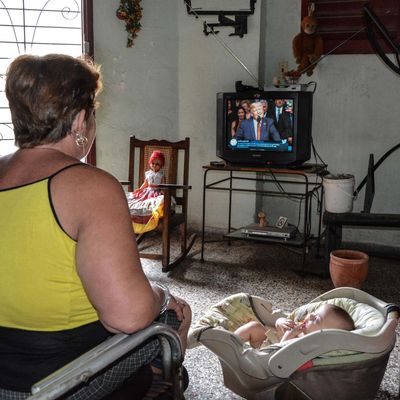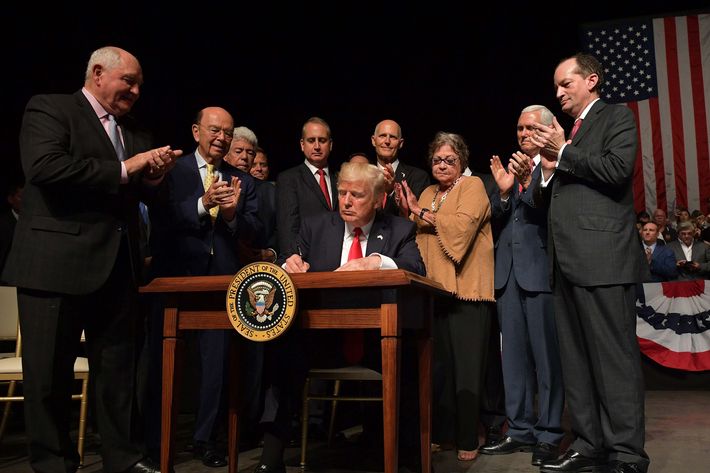
Of all the steps Donald Trump has taken to undercut Barack Obama’s global legacy, Friday’s speech announcing new restrictions on business and travel in Cuba is hardly the most damaging or dangerous. (For damage, consider withdrawal from the Paris accord; for danger, the combative approach to Iran.) Trump’s partial reversal of the Obama administration’s “bad deal” with Cuba will take us a few steps backward toward a posture that long stood as one of the most glaring failures of American foreign policy, achieving the exact opposite of its intended effect decade after decade. But that approach could last so long, despite nearly universal recognition of its perverse consequences, because the stakes were not, in the scheme of American national-security concerns, especially high.
Still, if not the most damaging or dangerous, the Cuba reversal is in many ways the most revealing of Trump’s moves so far. It brings together all the worst attributes of the administration’s foreign policy: pandering to a narrow and aging but fervent slice of the Republican base; exhibiting a shameless hypocrisy with seedy criminal undertones; and, in its fixation on deal-making, confusing weakness with strength — and as a result, bolstering the very forces that Trump claims to want to counter.
For decades after the 1959 revolution, U.S. policy aimed to isolate Cuba and, through economic embargo and occasionally more aggressive means, force political change. But the primary effect was to entrench Fidel Castro’s repressive government, by offering a ready excuse for its own failings and an easy means of fanning anti-American nationalism. In December of 2014, Obama took a major step to change that. He made it easier for Americans to travel to Cuba and do business with Cubans. He announced that America would, for the first time in decades, have an embassy in Havana. And he called on Congress to end the economic embargo. He had previously lifted restrictions on the ability of Cuban-Americans to visit and financially support friends and family on the island.

The change was long overdue, but the political obstacles, principally an electorally important core of hard-line Cuban exiles in south Florida, had dissuaded previous presidents from doing much. But over the course of the Obama administration, it became clear how quickly the costs of Washington’s counterproductive Cuba policy were rising. (Serving in the administration as an adviser to former Secretary of State Hillary Clinton, I saw again and again how American isolation on Cuba hampered our ability to make progress on important issues — including measures that might actually improve human rights or encourage democracy in Cuba.) Obama also recognized the faulty logic of longstanding U.S. policy, which assumed that Cuba would embrace democracy in exchange for American engagement. In fact, Cuban hard-liners — those most opposed to easing the government’s repression — were perfectly happy to keep American travelers, businesses, religious groups, and schools away. By making it easier to travel and trade, Washington would not be rewarding Cuban hard-liners; it would be undermining them by empowering individuals.
What looked like a political risk when Obama first considered it soon looked a political no-brainer. Most Americans grasped the sense of the administration’s move. (It does not take a public-policy degree to understand that if a strategy has served the opposite of its intended purpose for half a century, it might be time to try something else.) Seventy-five percent of Americans backed Obama’s opening, including more than 60 percent of Republicans. Cuban-Americans in Florida were at first opposed by a small margin. But within a couple of years, 69 percent said they supported Obama’s decision to establish diplomatic relations, and 63 percent wanted to end the economic embargo entirely. (This in a population in which Fidel Castro’s disapproval rating is 96 percent.)
But a core of mostly aging exiles still disagrees, and vehemently. Among their champions are some key Republicans in Florida’s congressional delegation, including Marco Rubio. Trump had made promises to this crowd during the campaign, promising to sustain the embargo despite his own record of (likely illegal) efforts to subvert it. (As a Newsweek investigation revealed last year, in the late 1990s, when the strapped Trump was looking for cash everywhere and willing to do anything necessary to get it, he had spent money exploring hotel and casino opportunities in Cuba, a violation of U.S. law.) Once in power, Trump gave those American hard-liners the inside line on fashioning his Cuba stance, shutting out not just policymakers and experts from the rest of the U.S. government, but also other Republican lawmakers with alternative views.
And Friday afternoon, standing in a Miami theater named for a veteran of the Bay of Pigs, Trump gave them what they want. He did not exactly “[cancel] the last administration’s completely one-sided deal with Cuba,” as he claimed. But by tightening restrictions on individual travel and blocking transactions that may benefit the Cuban military (because the military has a hand in much of the Cuban economy, that prevents a considerable amount of potential commerce), he can create enough obstacles and sow enough uncertainty among travelers and executives as to effectively undermine Obama’s opening.
In this promise to extend American isolation until the Cuban government changes in the ways Washington wants, Trump is embracing the same failed logic that governed U.S. policy for decades. For those in Havana most opposed to democratic change and human rights, U.S.-Cuban engagement is not a reward but a threat. The more the Cuban people can survive without being beholden to the government, the more they can communicate with the outside world (and especially the United States, where many have friends and family), the more deeply connected they are to other societies — the more hard-liners in the government will be under pressure to change. Since Obama’s opening began, repression has not ended. (On the contrary, there was an expectation that certain kinds of repression would increase, as hard-liners in Havana reacted to new challenges.) But many more Cubans now have cell phones and access to internet connections. Most are newly able to freely travel outside of Cuba. Hundreds of thousands have become entrepreneurs and small business owners. Companies like Google and Airbnb have rapidly built a presence on the island, and the number of American travelers has surged. The assumption was never that Cuba would be magically transformed, but that developments like these would foster more profound in change over time, driven by the Cuban people themselves. Trump’s approach promises the opposite. It is in the interest of Cuban hard-liners to keep their people isolated, and Trump is helping them.
During the Obama administration, there was an additional reason for urgency. It was clear that change was coming to the island one way or another, as since underscored by Fidel Castro’s death last November and Raul Castro’s decision to step down in 2018, putting someone other than a Castro in power for the first time in almost 60 years. Better, the thinking went, for Americans — especially Cuban-Americans — to be in a position to influence the course of change than to leave the field to others, especially outside powers and criminal actors drawn by the prospect of a foothold 90 miles from the continental United States. In April, a group of retired American military officers cited that concern (and also the value of U.S.-Cuban co-operation on counterterrorism and trafficking) in a letter to the Trump White House urging a continuation of the Obama policy.
Already, China and Russia are bolstering their economic and military presence in Cuba — increasing trade and investment, signing defense co-operation agreements, even, according to Senator Patrick Leahy, considering new military bases. The more the White House retreats from Obama’s opening, the more space Beijing and Moscow have to step in. That, too, has become a hallmark of Trump’s foreign policy. It may be the closest thing to a coherent Trump Doctrine we’ll ever have.





























